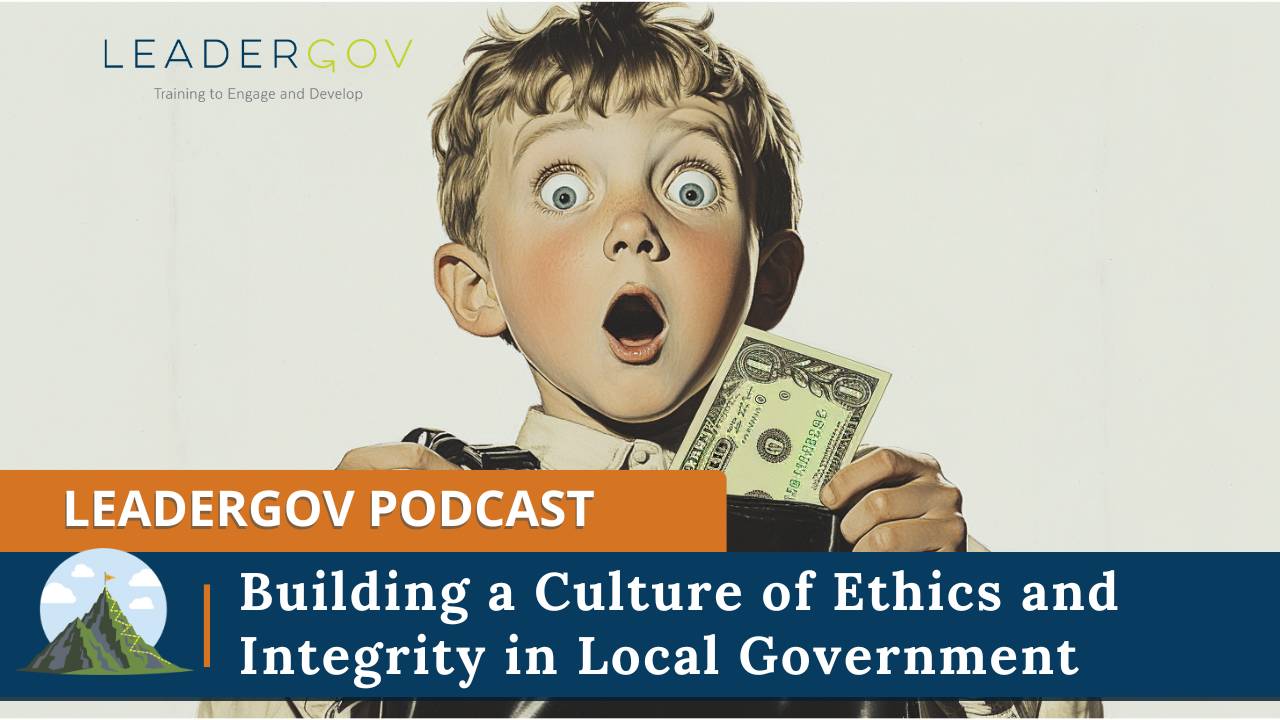Building a Culture of Ethics and Integrity in Local Government

Ethics and integrity aren’t just buzzwords in local government—they’re the foundation of public trust, team cohesion, and long-term success. When leaders prioritize ethical behavior, they create a culture where employees feel accountable, engaged, and proud of their work. But fostering this kind of culture doesn’t happen by accident—it requires intentional effort and strong leadership.
In a recent LeaderGov workshop, government leaders from across the country came together to explore practical strategies for promoting ethics and integrity in their organizations. Through insightful discussions and real-world examples, they uncovered key approaches to strengthening ethical standards within their teams.
Why Ethics Matter in Local Government
As William Whitson, a seasoned local government professional, put it, “working in local government is like "living in a fishbowl." Every decision, policy, and action is under public scrutiny. When integrity is compromised, the consequences ripple...
4 Reasons Why Diversity, Equity and Inclusion Training is More Important Than Ever

The movement for racial and social justice and a global pandemic has focused a spotlight on diversity training and its role in building a workplace culture of diversity, equity and inclusion (DEI) in local government.
As part of a multipronged strategy, diversity training can be a valuable tool in the DEI toolbox to engage, educate and motivate employees to be more inclusive in their thinking and actions.
A modern, interactive approach to training offers HR leaders new ways to:
1. Amplifies senior leadership’s commitment
Diversity training provides leaders with a dynamic platform for communicating the organization’s commitment to DEI, the importance of everyone participating in training and other initiatives, and setting expectations for behavior.
2. Raise awareness of unconscious bias
Unconscious bias or implicit bias − hidden attitudes based on social stereotypes which everyone has −is another concept that is part of the conversation on race, discrimination and DEI. Managing unc...
Resolving to be Your Best

According to a study by the University of Scranton’s Journal of Clinical Psychology, roughly forty-five (45%) of Americans make New Year’s resolutions. Seventy-five (75%) maintain them for a week and sixty-four (64%) maintain their resolutions for one month. Only forty-six (46%) maintain their resolutions for more than 6 months.
As a leader influencing your local government, it’s important to set strategic goals or resolutions for yourself each year – you might call them resolutions for your City, County or Department. While you probably have a Council or Commission or Manager eager to set goals for you, it’s important to pursue a few goals you see as vital to your team’s success.
The first step is to document your resolutions in writing. People are 50% more likely to achieve a goal if it’s written down.
A Look Back: Look back on the past year and consider what you did well and what you didn’t do so well. Consider which projects and initiatives succeeded and why they succeed...
How Appreciation Affects Job Performance

Want something you can do that is free and yields a 40%+ growth in productivity?
In today’s blog we want to remind you of a free, yet powerful tool in your arsenal to help motivate employees and get them more engaged - showing appreciation.
Different from appreciation is recognition, where you point out something wonderful someone did. Recognition is conditioned on behavior. But appreciation has to do with the person… and how they add to the team.
Appreciation is based on who you are (your identity), and recognition is based on what you do your performance. The benefits of expressing appreciation are stunning. Both recognizing others and appreciating others has tremendous impact on employee performance.
According to a study by the HAAS School of Business at UC Berkeley, when people are recognized for work they did well (their actions) they are 23% more effective and productive over those that were not recognized.
Yet, when people felt valued and cared for by the team and you,...

